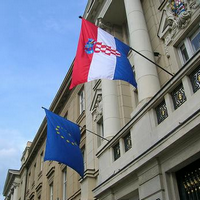Editor’s note: This is the second in a two-part series examining the European Union’s approach toward the integration of the Balkans into the union. Part I examined the record of EU integration to date. Part II examines the road ahead.
With the global spotlight focused on the European Union’s ongoing debt crisis, the European Commission’s recently issued reports on the progress Western Balkan countries are making toward accession may seem marginal. But for these nations, the achievement of EU membership is an essential symbolic and practical goal. As the reports indicate, this goal is still a long way off, even in the best-case scenarios.
The only exception is Croatia, one of the region’s more affluent and politically stable countries, which will almost certainly join in the summer of 2013. The EU praised Zagreb’s success in meeting accession standards, though it noted the need for further economic structural reform. However, even Croatia will have taken nine years between the start of membership negotiations and accession, meaning that patience is in order for other Balkan countries with significantly poorer records on political, economic and social progress.

